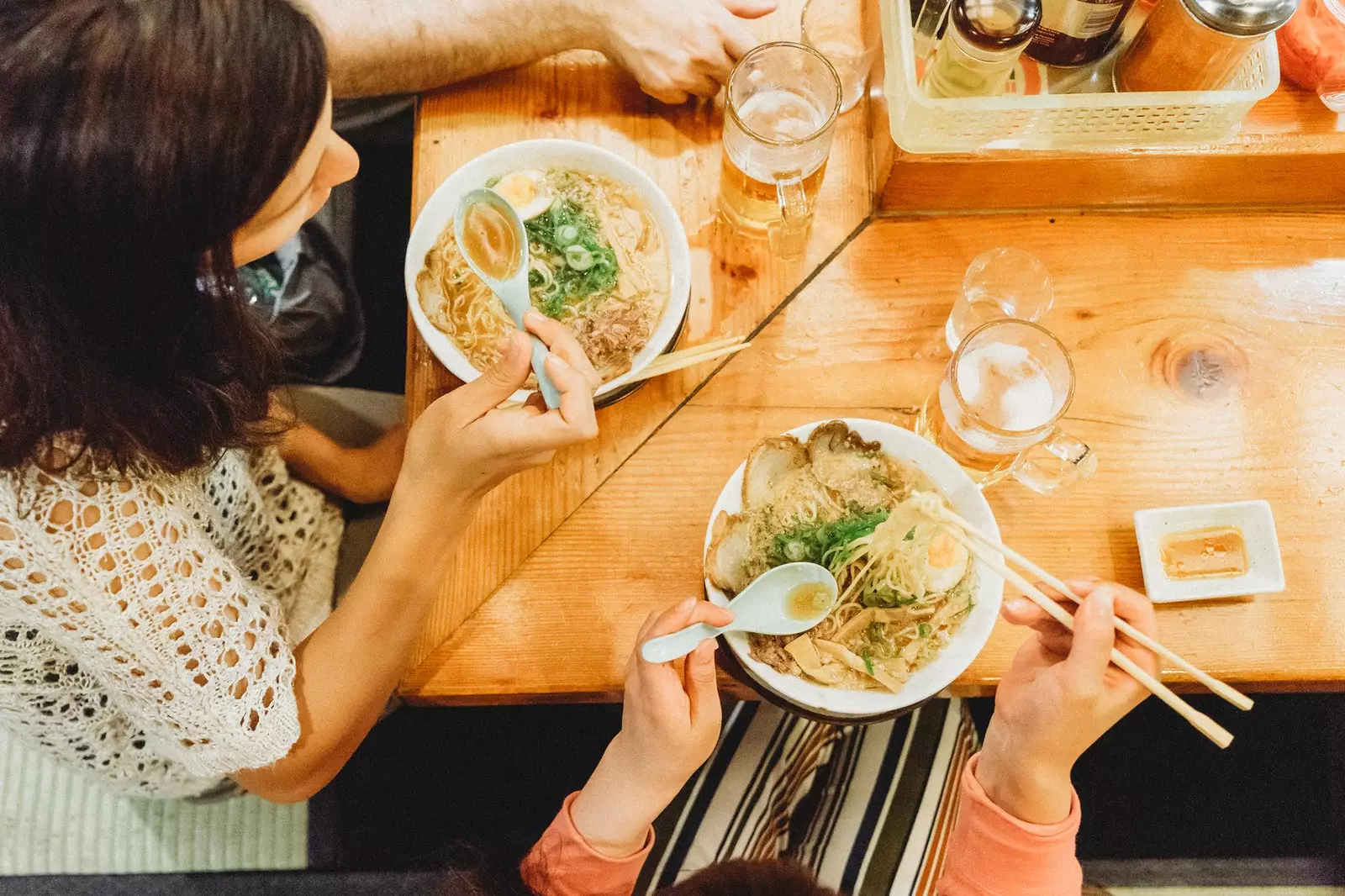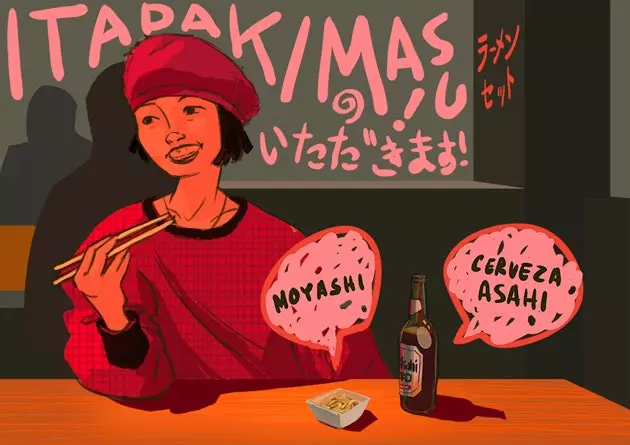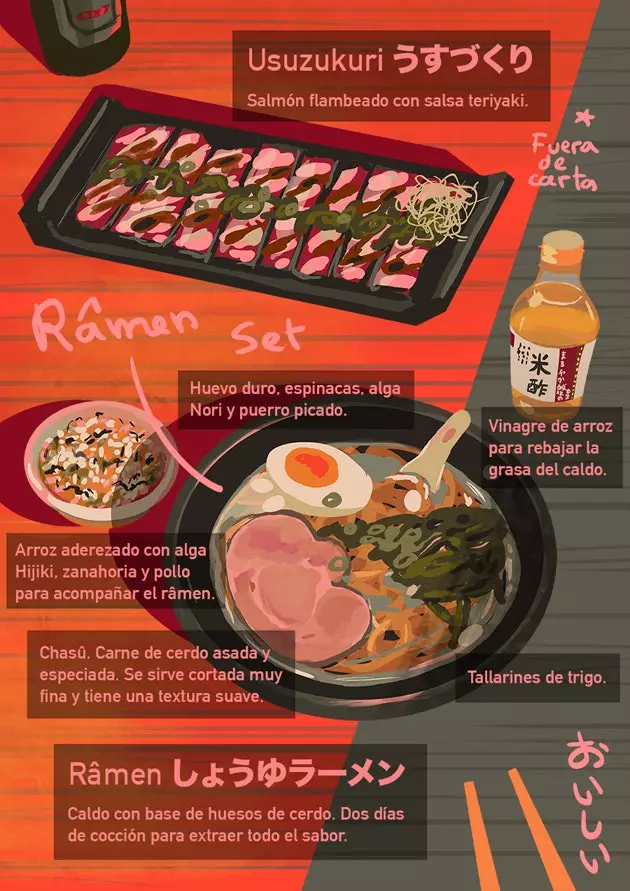
not without my ramen
If I had to choose a memory that described my early childhood in a peripheral neighborhood, from the entire album of my sound and olfactory memory, I would choose that captivating mix, as stimulating as it is primitive, that they offer us popular markets.
Those in which the soniquete of the salty salesman sheltered behind his gender is diluted with the complicit laughter of the clientele, the metallic sounds of the closures and the smell of fresh vegetables, pork sausage, decapitated chicken and monkfish and the sea bream, shiny and silvery, resting on thin layers of ice...
Makiko-san she awaits us smiling (and hungry) at one of the four coveted YokaLoka wooden tables, surrounded precisely by that characteristic atmosphere which, fortunately, continues to breathe in this traditional market of Neighborhood of the letters . "When I come to eat here I feel at home. I come to eat at my friend Yoka's house."
This is how Makiko Sese describes us, who wins her rooms in the capital as Japanese teacher, translator and interpreter her (in addition to being involved in other projects linked to her native culture) the feeling she gets from sitting at the sushi-bar table of her compatriot yuka kamada .
" Virtually all the team is Japanese . In fact, all cooks are: professional sushimen and experts in other types of Japanese cuisine. Here I can taste dishes that I would not find in other Japanese food restaurants in Madrid, which usually offer too 'classic' options . Here I find that home cooking that I miss so much."

Not without my ramen: how to taste it like a real Japanese
A palate with Japanese "homesickness" he is very demanding and does not settle for substitutes. One of the dishes most longed for by Japanese residents outside its borders (and for which they are able to live authentic peplum in their search for the most genuine flavor) is the ramen ( ) .
"It is an essential menu of the day. Our culinary obsession . I cannot live without râmen. Curiously, it is not a dish of Japanese origin, but imported from our neighbors. That concept of noodles with broth is more typical of China."
before entering ramenerian matter , the waiter offers us a otoshi (Japanese, appetizer or tapa). In this case, we are before moyashi (bean sprouts), a well-matched pairing for a very cold Asahi, a famous Japanese brand of beer that Makiko-san has chosen to accompany her menu. "Depending on the dish, I like to change the variety. I think that the perfect beers to accompany the râmen are Asahi, Tsingtao (very popular in China, where it originates from) and even the Spanish Mahou. I would never order, in this case, Sapporo or Yebisu."
Makiko-san is convinced by another of the day's suggestions and she decides to wait for her râmen while savoring a delicious fish-based starter : Flambéed salmon usuzukuri with teriyaki sauce ( ). Usuzukuri ( ) comes from usui ( ) , which means "fine", "thin" and tsukuru ( ) , a verb that means "to do" (something manual, especially), "to produce", "to cook" or "to prepare food" in the gastronomic context...) . It is a much finer type of cut than the one usually applied to sashimi. Our lone gourmet "clashes" the waribashi (disposable chopsticks; literally, "split chopsticks"), before starting to eat. When separating them manually, some chips remain attached to the waribashi, so it is advisable to carry out this little ritual. God is in the details, dear ones.
One of the cooks extends his hand to decisively press the horn that makes the waiters stand at attention: "Sumimasen! Jûni-Ban! Shôyurâmendesu!" An enormous black bowl, bottomed abyssal deep, steaming and aromatic, waddles toward our table. Behind him appears Yoka Kamada, who approaches smiling. He greets us and asks permission to sit down to eat with us. "I also have a craving for râmen today."
Makiko-san greets her with a brisk "okaeri!" , she rolls up her sleeves, grabs her renge (Japanese porcelain spoon) and prepares to sip her shôyurâmen ("soya"), a variant with a slightly more intense flavor than the other alternative offered by the establishment, the shiorâmen ("of salt"; it is presented seasoned with sesame). A portentous broth that is achieved, mainly, by keeping the pork bones in a slow cooker for about two days. "Of course. You have to extract all the flavor that is inside the bones," explains Yoka-san, while Makiko-san's cheeks, immersed in her nourishing activity, take on a pleasant touch of pink. Let's proceed to the dissection:

Everything you need to know about ramen is here
Yoka-san comments that the râmen offered by his establishment is teuchi (homemade, handmade) : " At YokaLoka we want to escape from the industrial . Our goal is to share authentic Japanese culture, in a place as authentic and popular, precisely, as a market can be."
Yoka-san goes on to explain to us the philosophy surrounding his business. As is the case with other establishments that are proliferating in the ins and outs of the capital's traditional markets, this type of initiative contributes to the fact that certain customary spaces can continue to be preserved bastions of popular culture ; agoras, in short, that must continue to be enjoyed by their own community.
"In Japan, unfortunately, that need to conserve what is indigenous, what is genuine, is being lost in favor of the department stores, the depâto ( ) or the so-called konbini ('convenience stores') or sebunirebun (- 7-Eleven), that are annihilating small businesses Yoka-san continues. "For example, at my town's station (Ekimae, literally 'in front of the station'), the small shops run by locals, which were fully operational when I was little, are already they are all closed. We could say that only 5% try to endure in the form of izakaya (Japanese traditional tavern) ; but 'chain' izakaya, so to speak. An absolutely contradictory concept. Although we could set an approximate comparison with what also happens in Spain, equivalence is not absolute , because what is happening in Japan in this sense is much more aggressive; And I think that people there question much less that this empire of the big chains is something very negative for the local commercial fabric. That was one of the main reasons that led me to start a business like YokaLoka."

A Japanese market kitchen in the heart of Antón Martín
One of the charms of the business of yuka kamada lies in his already mentioned interest in the transmission of Japanese culture, through one of the best ambassadors that exist, one who speaks an absolutely universal language: stomach ( Onaka , ) . He has recently decided to incorporate a chef specializing in haute cuisine into his team kaiseki ( kaiseki ryôri ) and in shôjin ryôri ( ) , very popular vegetarian cuisine in the Kyoto area, which has its origin in the dietary restrictions of Buddhist monks.
"It is a type of cuisine that we would like to introduce through specific events, apart from our daily activity in the Antón Martín Market," Yoka-san points out. "For example, earlier this year we conducted a sake tasting event with shôjin ryôri pairing; something very special..."
Makiko Sese finishes sucking, rhythmically, the last drops of the glistening brownish broth from his bowl . Satisfied, and after intoning the enthusiastic " Gochisôsamadeshita! "As a matter of fact, she tells us more anecdotes about the cult of râmen:" It is perhaps one of our most famous types of junk food, so to speak. For example, the Spanish, at 5 or 6 in the morning, when you have finished your revelry, you get hungry and go to a churrería, right? We go to the "ramenería". We usually say: Shimerâmendayone.. . (...) , which could be translated as something like: 'Are we going to eat râmen to end (close) the night?' That, or a good rice-based dish (-don). A little heavy, huh?
And the thing is, friends who embrace the night with an almost genetic predisposition, maybe that's where the real deal lies... In the nocturnal ode to râmen... *The YokaLoka Râmen-Set (12.20 euros) is accompanied by a bowl of seasoned rice, especially with vegetables and seaweed. It can be enjoyed on Tuesdays and Wednesdays outside the menu.
